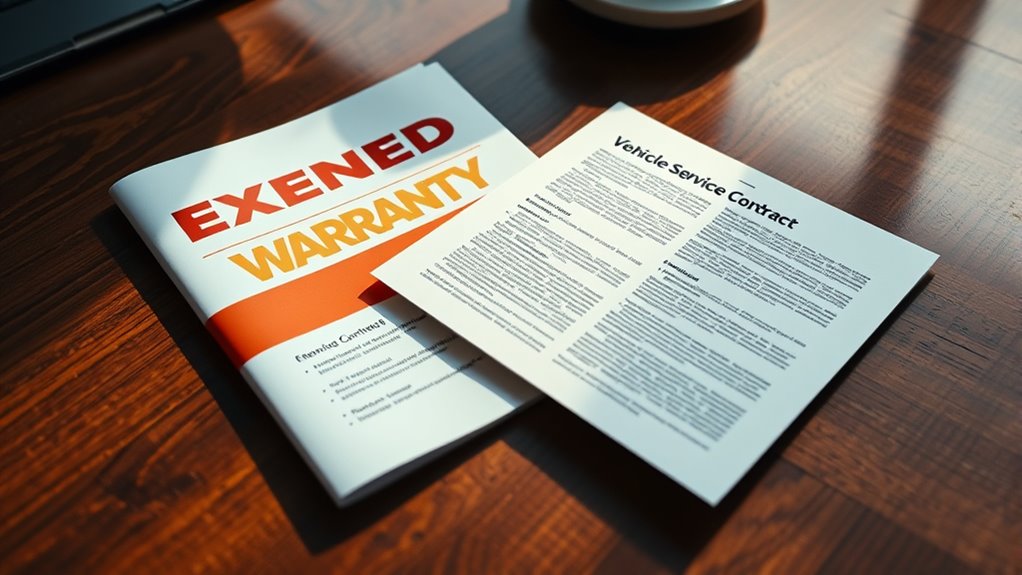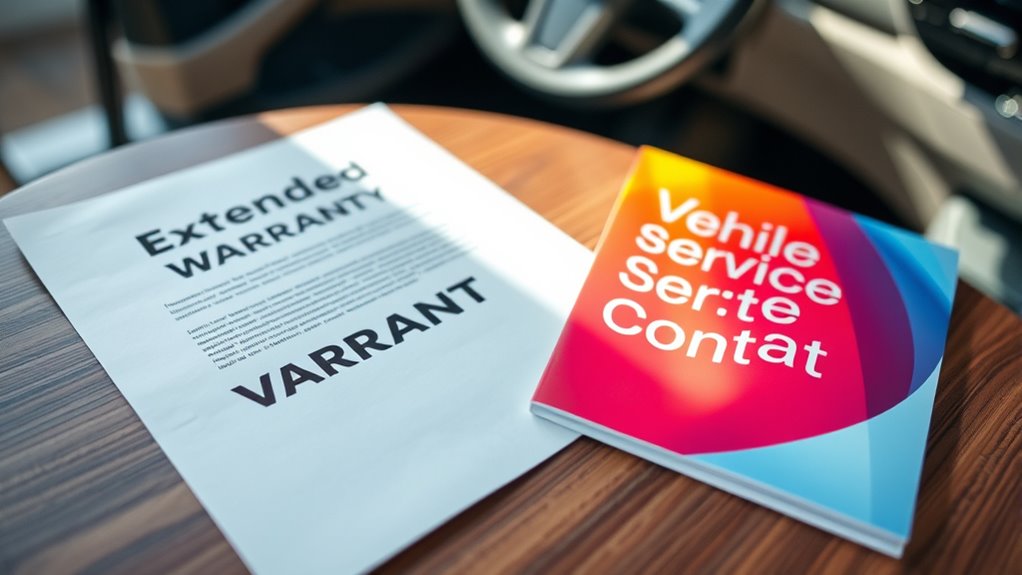An extended warranty acts like insurance, covering major repairs after the original warranty ends, but typically excludes routine maintenance. A vehicle service contract, on the other hand, generally includes both repairs and routine services like oil changes or tire rotations. Your choice depends on whether you’re looking protection against big, unexpected expenses or wanting all-inclusive coverage that includes regular upkeep. To understand which fits your needs best, keep exploring the differences and advantages further.
Key Takeaways
- Extended warranties cover major repairs after the original warranty expires, while vehicle service contracts include routine maintenance.
- Warranties typically involve a lump sum or monthly premiums, whereas service contracts may require copayments or deductibles.
- Extended warranties focus on specific components like engines or transmissions, with limited coverage for regular maintenance.
- Vehicle service contracts provide broader coverage, including oil changes and tire rotations, helping prevent neglect.
- Choosing between them depends on driving needs and budget, balancing protection against costly repairs versus ongoing maintenance costs.

When it comes to protecting your vehicle beyond the manufacturer’s warranty, understanding the difference between an extended warranty and a vehicle service contract is essential. Both options aim to safeguard you against unexpected repair costs, but they function differently and offer varying levels of coverage. An extended warranty typically acts as an insurance policy, providing maintenance coverage for specific repairs or parts after the original warranty expires. It’s purchased upfront or in installments, and you pay a premium for the peace of mind knowing your vehicle is protected. A vehicle service contract, on the other hand, often acts more like a maintenance plan. It covers a broader range of services, including routine maintenance like oil changes, tire rotations, and inspections, in addition to repairs. Understanding these distinctions can help you choose the right plan based on your driving habits and budget.
One of the key differences lies in what they cover. Extended warranties often focus on major repairs, such as engine or transmission failures, and may exclude routine maintenance. Conversely, vehicle service contracts tend to provide more exhaustive maintenance coverage, ensuring that regular upkeep is included along with repairs. If you want to minimize out-of-pocket expenses for scheduled services, a service contract might be more suitable. However, if you’re mainly concerned about costly repairs from unforeseen breakdowns, an extended warranty could be the better choice.
When comparing costs, it’s important to consider the overall value. With an extended warranty, you typically pay a lump sum or monthly premiums, and coverage is often limited to specific components or systems. The cost comparison involves weighing these premiums against potential repair expenses. Vehicle service contracts often have a different pricing structure, sometimes requiring copayments or deductibles for each covered service. While they might seem more expensive upfront, they can save you money in the long run by covering routine maintenance and preventing neglect that could lead to costly repairs later. Additionally, some contracts allow you to choose your preferred repair shops, adding flexibility and convenience. Furthermore, modern projector technology emphasizes clarity and coverage, much like comprehensive vehicle plans, to ensure optimal performance and peace of mind.
Frequently Asked Questions
Can I Purchase Both an Extended Warranty and a Vehicle Service Contract?
Yes, you can purchase both an extended warranty and a vehicle service contract. While the extended warranty typically offers manufacturer coverage for major repairs, a vehicle service contract often includes roadside assistance and other benefits. Combining both can give you thorough protection, covering major components and roadside needs. Just check the specific policies to ensure there’s no overlap and that you’re maximizing your coverage for peace of mind.
How Do Coverage Limits Differ Between Warranties and Service Contracts?
Coverage limits differ markedly between warranties and service contracts. Warranties typically have a set coverage scope, often limited to major repairs, with fixed claim processes for qualifying issues. Service contracts may offer broader coverage, including routine maintenance, but can have more complex claim procedures. You should review each agreement’s specifics to understand their coverage limits and how smoothly the claim process will work when you need repairs or services.
Are Aftermarket Warranties as Reliable as Manufacturer-Backed Plans?
You might think aftermarket warranties are the wild west of auto coverage, but that’s not always true. While some lack the stellar reputation of manufacturer-backed plans, many aftermarket options now boast impressive reliability and solid warranty reputation. You can find trustworthy providers that protect your car just as well, often at a lower cost. Just do your homework, read reviews, and choose a reputable company—your car’s safety net depends on it!
What Are the Cancellation and Refund Policies for Each Plan?
You should review each plan’s cancellation procedures and refund policies carefully. Typically, if you cancel within a certain period, you’re eligible for a full or partial refund, depending on the provider’s terms. Some plans may require written notice, and refunds often depend on how much coverage you’ve used. Always check the specific cancellation procedures and refund eligibility before signing up to avoid surprises later.
Do These Plans Cover Repairs for Accidents or Only Mechanical Failures?
Did you know that over 60% of vehicle repairs are for mechanical failures? These plans typically cover mechanical failures, not accidents. You generally won’t find accident coverage included, as these contracts focus on fixing parts that wear out over time. If you want accident coverage, you’ll need to explore additional insurance options. So, for accidents, rely on your regular auto insurance rather than these service plans.
Conclusion
So, don’t let worries about costs hold you back from protecting your vehicle. An extended warranty or service contract can give you peace of mind, especially when unexpected repairs strike. Remember, investing in the right coverage isn’t just about saving money—it’s about securing your peace of mind and keeping you confident on the road. Don’t wait until it’s too late—protect your vehicle today and drive with confidence tomorrow.









